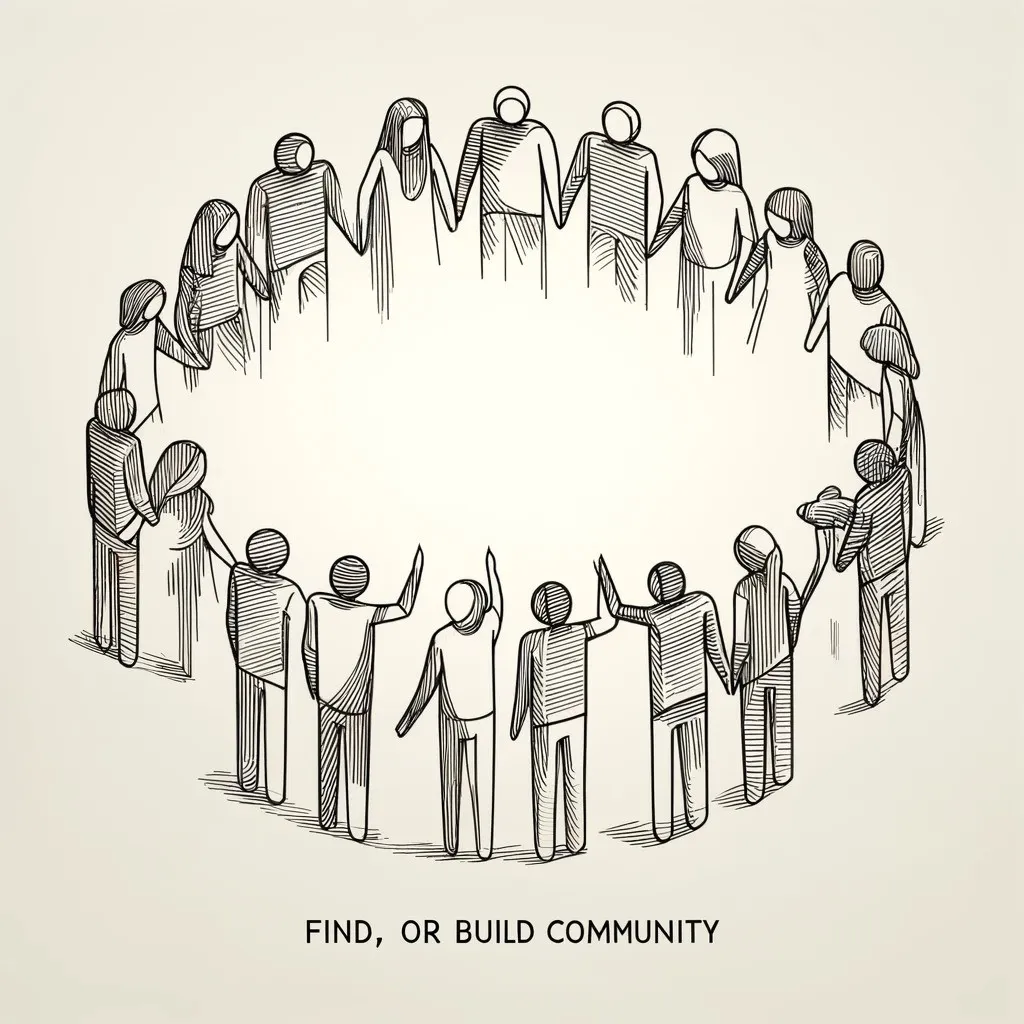On Unconventionality: Redefining Growth for Singaporean Students — My thoughts on the Singaporean education system, truly ambitious teenagers, and the need to explore in an AI age, to the hardworking Singaporean teenager (who seeks to do the best in whatever he can). Also viewable on Medium.
On Exploration and Genuine Interest Cultivation, in an AI age

Image generated by DALL-E.
So far, in my previous pieces, I’ve outlined several limitations of Singapore’s education system (mainly our focus on metrics) and the phenomenon of not having ambitious, unconventional outliers. So as per the intro, rather than providing suggestions for structural reforms, what can students do about this?
I admit that this call for exploration and genuine interest-cultivation isn’t for everyone–some might be better off studying harder, putting more effort into learning fundamentals in a structured environment.
But for those who want to do more beyond the bounds of school, read on.
I would like to preface this by saying that there’s nothing that you must do. These are suggestions, aggregated from my rather limited knowledge base.
This is different from school. There isn’t a set path to follow, nor are there metrics to judge yourself by. Even when we think about Rise, Atlas, or other fellowships that promise to identify talent at a young age, we must be cautious — optimising your profile just so that we could get into one of these (and make it another metric to gun for!) is a pitfall that we’re all prone to falling into.
We need to be open to this idea of reflection, exploration, and taking quick action now more than ever. The rise of AI (or more specifically in the past few years, LLMs) has only served to highlight this. If we go by traditional metrics of grades, LLMs can already outperform the majority of us. With LLM-enhanced search engines like Perplexity and you.com, a coherent answer from various sources can be generated. That’s just built on top of non-task specific AI. When we consider the rapidly growing number of domain-specific LLMs (and the rate at which they are becoming better at their job), it begs the question: can we rely on school (solely or otherwise) to help us venture forth into the future?
It’s worth to note that the systemic shift away from grades had begun way before the current AI wave–back in 2016–when the decision was made in Parliament to remove the T-Score. But that deeply rooted belief in metrics has hardly worn off.
Now that we have this amazing new technology before us, how can we utilise it to our advantage?
- Think. Reflect.
- Explore and learn.
- Build. Or create.
- Find (or build) community.
- Seek mentors + get feedback.
Think. Reflect.
 Image generated by DALL-E.
Image generated by DALL-E.
Employing first-principles thinking is helpful in understanding your desires. Techniques like socratic questioning and the 5 whys reveal implicit assumptions and unfounded fears about pursuing the unconventional.
Personally, I’ve felt that the constant pursuit of metrics and being in a rather closed environment meant that most thoughts revolved around optimising whatever resources I had for said metrics. This left little time and energy for me to stop and think about why I was doing what I was doing. Beyond the spontaneous questions that I’ve asked in On Metrics and Games, here are some that I’ve found to be helpful (this is just one aspect of growth, though):
Growth — why am I pursuing this? in what way does it help me to grow? do I want to grow in this manner? where does this lead me 5 years from now? what about 10? am I doing it just because my friends are doing it?
And this doesn’t just apply to professional development. It could have implications for your relationships, your spiritual life, etc. For me, questioning my belief system leads me to uncover aspects that I’ve not previously known or thoroughly believed.
One concrete example that I would use would be my (varsity/ high school / Secondary to JC) cross-country journey! I’ve always wanted to excel in running, but that individual medal for National School Games (perhaps that’s why I’m writing so much about it, haha) has always eluded me. So when it came down to choosing whether to continue pursuing the sport competitively between Sec 4 and JC1, I sat down for a long reflection session to really uncover what drove me to gun so hard for that medal. In the end, the answer that I reached was not sufficient for me to continue that pursuit for another 2 years, despite having sunk 4 years into the sport (and I’m still running by the way, just non-competitively).
Explore and learn.
 Image generated by DALL-E.
Image generated by DALL-E.
I believe there has never been a better time to start exploring. Interest is a result of what we’re exposed to and what we’ve been good at. Passion is not so much innate and passive as much as it is an active pursuit of interests. We find certain games fun because we’re good at them. So exposure to different ideas and perspectives are crucial for development , especially beyond the confines of school. Many writers much better than myself have attempted to unpack this idea of exploring and finding interest:
Books (On passion and interest — the whys and hows of cultivating them):
- So Good They Can’t Ignore You by Cal Newport
- The Passion Paradox by Brad Stulberg and Steve Magness
- Range by David Epstein
Long-form blog posts
- Paul Graham’s How To Do What You Love — particularly the section on Bounds
- Naval Ravikant’s argument that specific knowledge can be found by pursuing curiosity
How should I decide when to move on from pursuing something? Exploration necessarily means that there’s time spent delving into a particular area, before moving onto the next. It’s analogous to navigating in a submarine — every once in a while, it’s necessary to resurface, reorient, establish communications, before diving back down. It’s not a straightforward answer — but my intuition is that youths will be well served by focusing and spending more time rather than less on a particular pursuit for a good gauge of interest. To give a tangible, real life example, I used to hate running. Only after sticking to it for 4–5 years, I discovered that it’s a great habit to keep and even optimise for.
What does exploring look like tangibly?
“What explore? So vague!” There’s good advice from Laura Deming: get obsessed with a topic and question everything. Find things that make your mind go “now that’s cool!”, write them down, and soon you’ll have a general interest in certain things. Literally use ChatGPT to find out more. It could be as simple as taking the first step of watching a series of YouTube videos or a set of Coursera courses to learn about a concept. This could range as widely from hard sciences (astrobiology, machine learning, genomics) to more abstract fields of study (philosophy, art, literature). One YouTube channel I really love is Kurzgesagt.
Build. Or create.
 Image generated by DALL-E.
Make something around whatever that you’re interested in. Paul Graham recounted how Steve Jobs worked on things that he was interested in but had no apparent connection at face value: calligraphy and electronics. We all know that design and hardware is what makes Apple so successful today. In the same essay, PG calls teens to make or build–basically a production of work rather than passive consumption. A fun experiment could be: the next time you scroll TikTok or Instagram, ask yourself how you could be making those viral videos instead of just watching them. If that doesn’t appeal to you, try other methods–writing, drawing, or something else. As Naval puts it, product, code and media are all great forms of leverages; the beauty is when you combine all three.
Image generated by DALL-E.
Make something around whatever that you’re interested in. Paul Graham recounted how Steve Jobs worked on things that he was interested in but had no apparent connection at face value: calligraphy and electronics. We all know that design and hardware is what makes Apple so successful today. In the same essay, PG calls teens to make or build–basically a production of work rather than passive consumption. A fun experiment could be: the next time you scroll TikTok or Instagram, ask yourself how you could be making those viral videos instead of just watching them. If that doesn’t appeal to you, try other methods–writing, drawing, or something else. As Naval puts it, product, code and media are all great forms of leverages; the beauty is when you combine all three.
Most of the problems that you face, people face too. If you identify a gap in resources, plug it, even if at face value it doesn’t give you any immediate value. I think it’s necessary to preface this by saying that this is where the trap of focusing on short term metrics comes in. In the here and now, writing this article doesn’t give me any immediate benefit, nor is it aligned with my short term goal of finishing up a hackathon idea. I don’t know what value this would give me, I just thought that it’d be a good idea for me to get my thoughts out of my head on text. Neither do I think that it’s a good idea to brag about this on my resume, or on LinkedIn (apart from using it as a platform to boost view count lol). But sometimes the best ideas arise from these spontaneous acts of creating value. Here are some LOCAL (grew up in a local ed system type thing) examples to get you started:
- A friend of mine created r/SGExams, the largest community discussing all things student life right in the middle of his A-Levels because he couldn’t find enough practice papers to do (so funny, right).
- Another created Dime, a budget app with an amazing UI just because he felt that there wasn’t anything good enough out there.
- Personally, I wrote a guide on how to get good at the 2.4km after identifying that there was no such resource (written!) online. It is still my most read Medium piece to date (lol).
With LLMs being able to help you write code and generate ideas, it’s never been easier to ship. Inspiration is perishable — act on it immediately.
Recently, I was having a chat with some TKS friends, and perhaps the best explanation of why we lacked unconventional wasn’t just the part on culture, but it was because we lacked problems to solve. Living in a privileged, first-world island nation meant that we didn’t live through much problems, and as a result, are okay with not building to solve problems that we don’t face.
Find (or build) community.
 Image generated by DALL-E.
Image generated by DALL-E.
School is not a drab place to be precisely because of the people that you do school with. The shenanigans that everyone is doing at some point or another makes it so much more enjoyable than just a slow, painful grind to the eventual exams.
“You’re the average of the five people that you spend the most time with.” That gets thrown around a lot, but the rule is largely true — who you surround yourself with reinforces (or destroys) certain behaviour.
So you would want to find a group of friends to do this life of ambitious learning + building with. I’d assumed that there weren’t such people in JC but that’s because I wasn’t looking hard enough.
Locally, I don’t think there isn’t a set community of ambitious youths yet. I think it’s hard to quantify what ambitious means, so generally look out for youths that are doing cool projects in the area that you’re interested in. I’ve found quite a number of friends online that have (thankfully!) translated into great in-person friendships.[^1]
You might be asking, how then should I go about connecting / networking / making friends? I think that Twitter (or X) is a good place to start. There are very interesting individuals there — of course, you have to dig a little deeper if you want quality signal. Reaching out through quality cold DMs is a good way to start. Some Singaporeans that I find interesting on Twitter just because of their unconventionality (I don’t know them personally though, so please don’t spam them):
- Visa — It’s crazy how he started off documenting his story way back from one of the earliest Singaporean metrics to determine how smart a child is (the Gifted Education Programme), adding on the nuances and realities of life to show how he has progressed and developed since then. He also gives great advice for anyone starting out in JC1. Coined the term Friendly Ambitious Nerd, which I feel is a great description for people I would love to surround myself with.
- Pradyu — Great econ / public policy substack! And super approachable IRL. He even has a podcast with Tyler Cowen which, in my opinion, covers a lot of my thoughts on this matter! Highly recommend checking it out.
If you look beyond Singapore, that’s where things really start to open up — there are a whole slew of open and closed communities that might be worth your time to (try)[^2] joining (you can search these communities up on Twitter! or just google them):
- The Knowledge Society (where most of my friends outside of school are from)
- Buildspace (imo low barrier to entry, need to just have an idea to build out)
- Atlas Fellowship
- Emergent Ventures
- Foresight Fellowship
- Interact Fellowship
- Z Fellows
- 776 Fellowship
- Inter Intellect
- Socratica
- The Residency
- Gen Z Mafia
- Masason Foundation, etc.
Serendipity is a powerful thing. It’s crazy how putting your content out on the web can gain you traction and find community too.
Seek mentors + get feedback.
 Image generated by DALL-E.
Image generated by DALL-E.
I love being the youngest sibling in my family. Being the youngest means that I can take the learnings of all my older siblings and distil it into bite-sized nuggets of wisdom for me to chew on. Sometimes, as a rather young child, I would wonder why they do certain things or talk about certain subjects, only for me to realise what exactly they were referring to 10 years down the road, when I went through that. It was that “ohh, aha!” moment.
So having people who are older than you to guide your learning — be it in technical skills, pathing your developmental journey, etc. You would want to have someone who has gone before you, done life before you did, to guide you along too.
While most people are busy, I’d like to bet that at least some are willing to help you along, especially if you show enough interest and dedication to learning and growing.
I think this is crucial especially in the age of AI. It’s so easy to aggregate information with LLMs; it’s so easy to hear different perspectives and opinions, it can easily get terribly overwhelming. Physical mentors can help to discern signal from noise with a little wisdom that they’ve accumulated over the years of exposure in the industry.
I want to end off with some more examples of teenagers that I found to be interesting and unconventional. These examples aren’t local (maybe because I haven’t found such people yet). The point being: it’s doable, even without school, and more common than you think. This is also not an exhaustive list or ranking of anyone by merit, I was simply attempting to choose people who had varied experiences.
Will DePue — Youngest person I know who’s working at OpenAI who has been on their technical team (Sora). Also super interesting to see that he was an early creator of communities like Gen Z Mafia and Colossus. I think it’s just super inspiring to see fellow ambitious teenage builders chat. Here’s a full interview transcript between Avi Schiffman (Tab founder) and Will, both serial founders + entrepreneurs.
Diego Vera — I first learnt of Diego Vera through Scott Young’s blog, where he basically replicated what Scott Young did with MIT’s undergraduate computer science curriculum. I had already found Scott’s journey remarkable because it challenged the notion of needing a degree from a well-known college to receive the corresponding level of education. What Diego did was incredibly if not more remarkable, where he would wake up at 3.30 daily to start his routine. And from the last time we chatted, he seemed to still be sticking to this routine, even after completing this challenge. So there’s nothing stopping you from embarking on a project similar to his, other than discipline and some initial interest to get started.
Tanishq Abraham — Whiz Kid. I don’t really know how else to describe him. PhD at 19, and such a great contributor to the ML space.
Zelda Poem — You can find more about her story here. She essentially published her first book on hacking your education when she was 18.
Conclusion
Hot on the heels of the previous two articles, maybe some readers might be thinking: it’s fine to be normal, right? Why is there a need to be exceptional? After all, we should shun elitism and pursue excellence. Of course, there is a distinction between elitism and excellence, as stated in that article. And interestingly enough, there was a sentiment raised that youths feel that it is harder to enjoy the same degree of social mobility that their parents did.
Here are my two cents on this: I honestly feel that this process of building, creating and pushing work outside of school and doing things organically online actually makes it more democratic rather than less. The amount of serendipity that one is exposed to from pushing content (through whatever medium — in prose, media or code) online is unparalleled, even as the world grows increasingly digitalised.
Of course, I have caveated that this path of creation / building might not be for everyone, but I believe that everyone should at least be exposed to this notion.
I’d actually like to give a shoutout to schools and the larger ministry for starting the shift in attitude. It might not be as drastic as needed, but at least there’s some headway made in getting students to think more about their futures. Understanding careers and joining career-oriented communities are a good start: Kranji Secondary School organised a Day X programme, a half-day career exploration workshop. Raffles Institution is well known for (apart from being a rather prestigious school) it’s GAP Semester, where students are free to explore. Resources like the On My Way platform by the National Youth Council is also a great start.
We need a rethink of what working hard in a school environment truly means. We need a reprioritization of unconventional growth, beyond the structure of local education. Most importantly, with the rate of technological advancement, we need students to take charge of defining their own interests from a young age.
Why now?
I’d like to think that Singapore is at an inflection point. We can’t keep producing students who only know how to conform and follow the rule book if we want to truly be leaders in our own right. We’ve always echoed the sentiment that “our most valuable asset is the ability of our people.” We’ve prided ourselves in the fact that we have been able to make it out of the rut, to succeed.
Is this the way forward? I’m not sure. To me, the answer is obvious– we can’t rest on our laurels NOR stay the same in the way that we’ve been. Else, we fail to adapt and remain at the frontier. The government recognises this. Now, it’s time for students to start making a change, too.
We need to innovate. The biggest risk is not taking any risk.
It’s never too late to start. Starting this process of exposure, exploration and building now is better than never starting at all. And I believe in the high level of agency of hard working teenagers, like yourself :). As my friend quips, he who runs for fun doesn’t get tired. So let’s start building and shipping out of intrinsic interest and see the myriad of opportunities the world has to offer.
Once again, thanks Michael and Joao for allowing me to see the edsystem in a new light back in my schooling days.
Thanks Kuang Wen, Michael, Zhen, Aaron and Jean for reading through the essay and giving your thoughts.
[^1]: It’s necessary to develop a bs filter to determine who you actually want to hang out with! [^2]: Sometimes, the bar to joining these communities is actually really high, so don’t be too disappointed if you can’t get in! always better to form an organic connection with people around rather than optimise (again) to get into these.